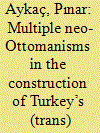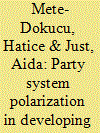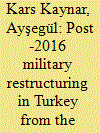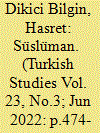|
|
|
Sort Order |
|
|
|
Items / Page
|
|
|
|
|
|
|
| Srl | Item |
| 1 |
ID:
185544


|
|
|
|
|
| Summary/Abstract |
After coming to power in 2002, the Justice and Development Party evoked the ‘glory’ of the Ottoman past, seeking to expand Turkey’s cultural sphere of influence to the former territories of the Ottoman Empire – a phenomenon commonly referred to as neo-Ottomanism. While neo-Ottomanism is generally discussed as a component of foreign policy, the Turkish Cooperation and Coordination Agency’s (TIKA) intervention in the heritage dynamics of foreign countries was intimately linked with domestic policies. This paper discusses how neo-Ottomanist policies selectively created transnational heritage sites, and how these sites have dialectically become instruments of domestic politics.
|
|
|
|
|
|
|
|
|
|
|
|
|
|
|
|
| 2 |
ID:
185542


|
|
|
|
|
| Summary/Abstract |
This paper examines party system polarization over 19 general elections in Turkey from1950 to 2018. Using data on party policies from the Comparative Manifesto Project (CMP), we show that, contrary to the common view, party system polarization is not a persistent feature of Turkish politics. We also find that party system polarization on the left-right continuum reflects party differences primarily on social rather than economic or European integration issues. Finally, our results demonstrate that the military interventions in 1960 and 1980 reduced party system polarization in subsequent elections, even when controlling for other determinants of polarization. These findings have important implications for debates on party politics, military rule, and the prospects of democratic governance in developing democracies.
|
|
|
|
|
|
|
|
|
|
|
|
|
|
|
|
| 3 |
ID:
185547


|
|
|
|
|
| Summary/Abstract |
Pro-government protests are on the rise in recent years, mostly in populist and/or authoritarian settings, including Turkey. Based on the literatures on populism and social movements, this paper looks at the first mass pro-government mobilization in Turkey, namely the Respect the National Will rallies organized in the summer of 2013. To understand how these rallies contributed to democratic backsliding in the country, the article uses critical discourse analysis. Four discursive mechanisms were identified in play in Turkey during these rallies: nomination, predication, argumentation and intensification. The article argues that the rallies were countermobilizations organized by the ruling party, and this mobilization and the discourse mechanisms used further contributed to democratic backsliding in the country by delegitimizing anti-government protests and protestors, shrinking the democratic space for opposition and opening the path for increased levels of pro-government mobilization.
|
|
|
|
|
|
|
|
|
|
|
|
|
|
|
|
| 4 |
ID:
185545


|
|
|
|
|
| Summary/Abstract |
This article focuses on the post-2016 military reforms and examines the meaning of civilian oversight and control that these reforms have brought. For almost two decades, the establishment of civilian supremacy over the military has been discussed in terms of democratic control of the armed forces. The article claims that although the post-2016 reforms installed civilian supremacy, they diverge from this approach significantly. Instead, they display the basic characteristics of coup-proofing strategies. The article aims to ignite scholarly interest in and initiate discussions on the conceptual appropriateness of the notion of coup-proofing for capturing Turkey’s civil–military relations since 15 July 2016.
|
|
|
|
|
|
|
|
|
|
|
|
|
|
|
|
| 5 |
ID:
185548


|
|
|
|
|
| Summary/Abstract |
The key puzzle that this article explores is how the Great Powers’ wedging strategies and Turkey’s efforts to balance these powers defined complex strategic alignment dynamics during the 1930s and World War II. We posit that in the 1930s, as Turkey strove to balance the European great powers, these powers resorted to wedging strategies to sway Turkey away from any other sphere of influence. During World War II, increasing US engagement in the region compelled Ankara to utilize a ‘dual balancing strategy’ to preserve its neutrality, by balancing between the Axis and the Allies and between the British and the Americans. Concomitantly, both Allies and Axis powers utilized predominantly reward-wedging strategies to keep Turkey away from the opposing bloc. We assert that in rethinking strategic alignment more emphasis should be placed on the interactive nature of wedging process and the role and motives of agency.
|
|
|
|
|
|
|
|
|
|
|
|
|
|
|
|
| 6 |
ID:
185549


|
|
|
|
|
| Summary/Abstract |
The freedom of media is an essential component for democratic settings; however, in some contexts, citizens experience several barriers to enjoy this right in full. Replacing conventional media channels, social media is becoming an indispensable medium to express and discuss politics in such environments. Yet, there is little consensus in the literature about how social media relates to offline political participation, especially in settings where citizens do not experience media freedom in full. By using survey data that has been collected after the Turkish general election of 2018, this article aims to display the relationship between social media use and offline political participation. The analysis reveals offline political participation is related to sharing political views online and exposure to alternative political ideas.
|
|
|
|
|
|
|
|
|
|
|
|
|
|
|
|
| 7 |
ID:
185550


|
|
|
|
|
| Summary/Abstract |
This article argues that class divisions within Islamist community are an emerging aspect of contemporary Turkish politics. Nearly two decades of rule by an Islamist party enabled the Islamic capital to become a distinct capital fraction without improving the living conditions of the devout masses substantially. This fault line appears in the increasingly discernible criticism of the everyday lifestyles of rich Muslim women from within. Controversy over the extravagance of veiled women appears as a proxy class struggle between the new Islamic middle class and the devout poor, as well as the continued polarization between the Islamists and the secularists.
|
|
|
|
|
|
|
|
|
|
|
|
|
|
|
|
|
|
|
|
|